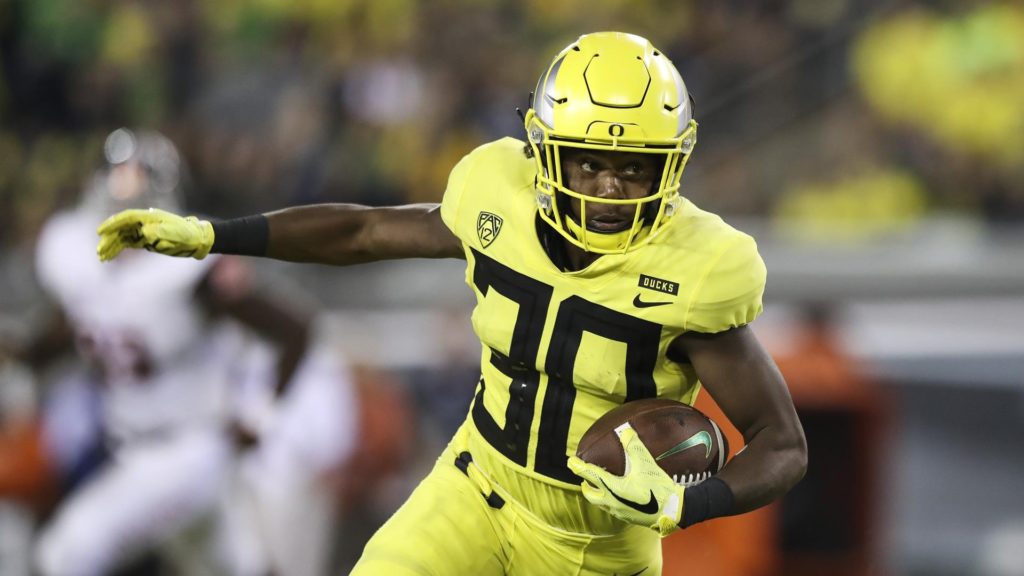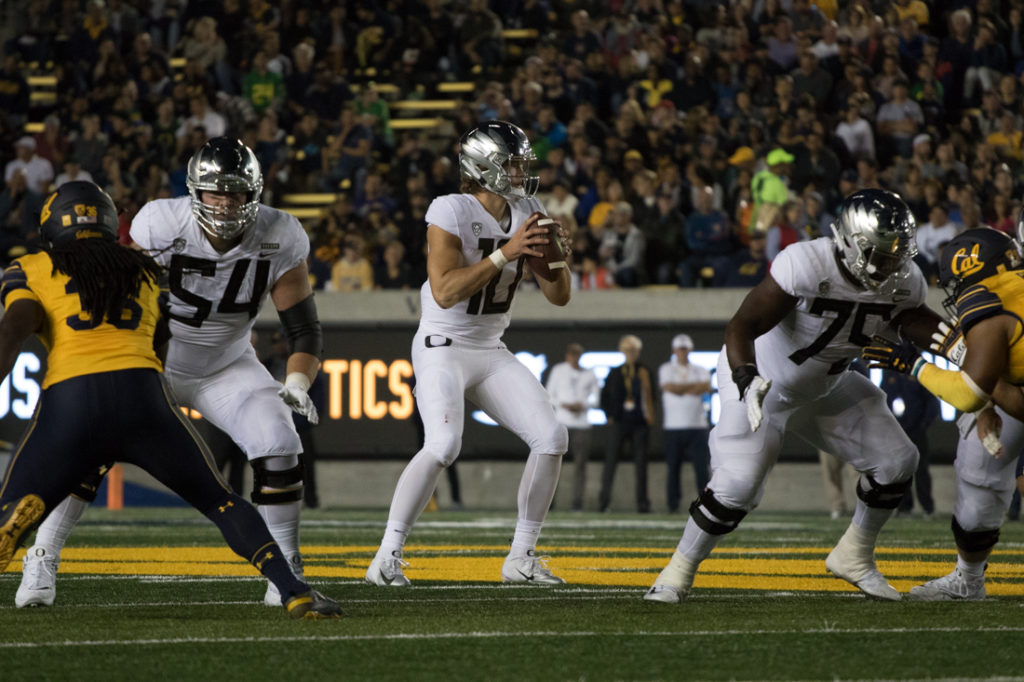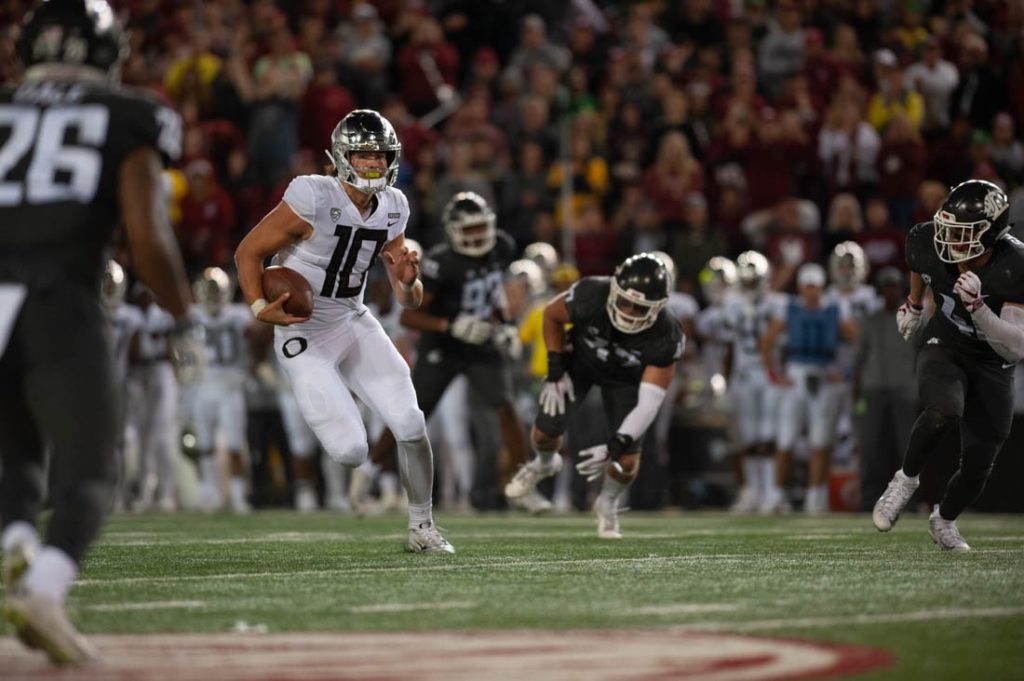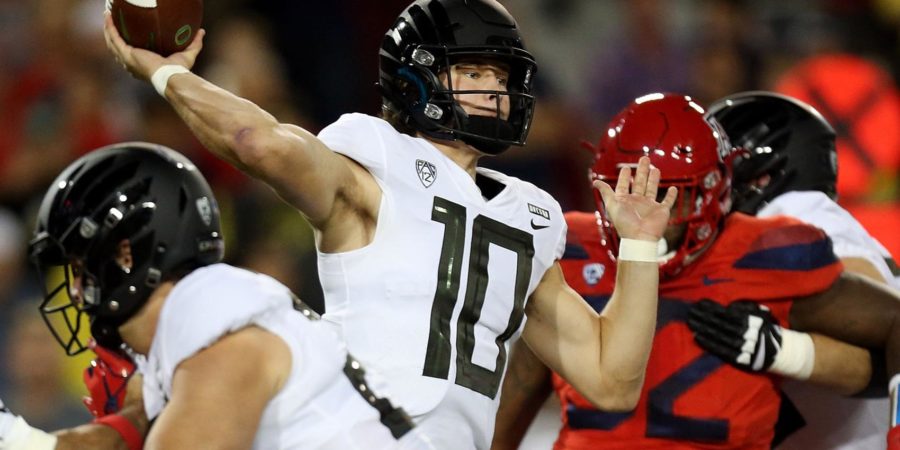With Oregon’s hopes of contending for a Pac-12 Championship this season effectively dashed, it’s difficult to peg any game from this point forward as “must win.” However, in examining the ways in which Oregon has been defeated the past two weeks, it is officially gut check time for head coach Mario Cristobal’s charges.
In this space, and elsewhere, talking heads have harped on Oregon’s staggering ineptitude of late, particularly on offense. And indeed, the Ducks have been a far cry from the team that exuded composure and a knack for timely execution through the first six weeks of the season. Against Washington State two weeks ago and Arizona last week, Oregon struggled to generate any semblance of sustained momentum, resulting in early deficits that proved too large to overcome.
This week, UCLA has been painted as the ultimate get right team for Oregon to face. And for good reason. Though they’ve shown signs of incremental improvement over the past several weeks, they’re ultimately a 2-6 team that ranks dead last in the conference in total offense and scoring offense, and second to last in total defense and scoring defense. If the Ducks fail to get back into the win column this week, it may well prove to be their final opportunity to do so this season.
As the Ducks look to notch win number six with Chip Kelly making his return to Eugene, WFOD examines this week’s keys to victory for Oregon.

1. New playmakers must emerge
With or without the services of Justin Herbert and Dillon Mitchell, the Ducks need someone – anyone – to step up and help provide a boost to an offense that has been reeling the past two weeks. Even over the first six weeks of the season, Oregon seemed overly reliant on the production of Herbert, Mitchell, and running back CJ Verdell. Sophomore wide receiver Jaylon Redd has shown flashes this season as he enters Saturday’s game as the team’s leader in touchdown receptions (5) and second-leading receiver in terms of receptions (22) and yards (271). If Mitchell isn’t cleared for action after suffering from concussion-like symptoms earlier in the week, Redd’s role figures to expand exponentially.
Beyond him though, options in the passing game are slim. The performances of Johnny Johnson and Brenden Schooler this season can be best described as inconsistent, if not disappointing, as neither player has appeared capable of posing a threat through the air. Johnson, in particular, has endured his fair share of frustrating moments this season. After showing impressive flashes as a true freshman in 2017 and enjoying a productive offseason that reportedly had him in line for an increased offensive role this season as a sophomore, Johnson has been a virtual non-factor, as drops have eroded confidence in his abilities. If there was ever a time for either he or Schooler to come through with a breakout performance, this would be the week.

2. The offensive line needs to get its act together
The other glaring issue for Oregon on offense has been the inconsistency upfront the last couple weeks. The Oregon offensive line was lauded over the first half of the season for their increased physicality, which had been a focal point for improvement in the eyes of Cristobal over the course of the offseason. However, ever since true freshman stud left tackle Penei Sewell went down with a regular season-ending ankle injury suffered against Washington, the Ducks have not been the same team in trenches. The group’s overall effort in pass protection has been passable, but ineffectiveness in owning the line of scrimmage and opening holes in the running game for Verdell and Travis Dye has been confounding.
Ranked as one of the Pac-12 best rushing offenses at the halfway point of the season, the Ducks have slid all the way to seventh in the conference following woeful rushing efforts at Washington State (58 yards) and at Arizona (84 yards). The performance against the Wildcats was particularly galling, especially considering the fact Arizona was ranked as the conference’s second-worst defense heading into last week’s game. On paper, the Bruins are a team the Ducks should take advantage of on the ground, but it’s hard to place much faith in this group based on what’s been displayed of late.

3. Avoid extended periods of “3-and-out” on offense
This, perhaps more than anything else, has been an absolute killer for the Ducks in their last two losses. Getting off to strong starts on the road is critical for any team, but it was a particular point of emphasis for Cristobal in the build up to each of the last two games. Oregon has responded to that challenge by falling flat on their face.
Against the Cougars, Oregon’s first three offensive series produced three straight three-and-outs. In fact, the Ducks’ first first down of the game came with just under three minutes to play in the first half with the Ducks already trailing 20-0. Last week against the Wildcats, six of the Ducks’ first seven offensive possessions resulted in a three-and-out, including four straight three-and-outs to start the game. Simply put, that’s inexcusable for an offense that features a quarterback the caliber of Justin Herbert. If Oregon has any plans of snapping their ugly two-game losing streak, this will be a trend that needs serious bucking.

